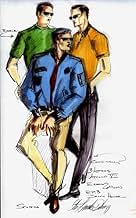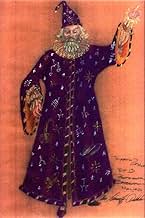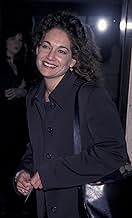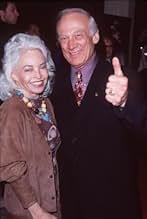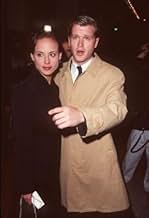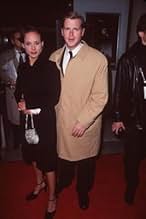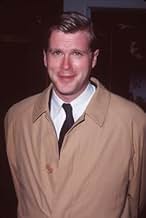Ajouter une intrigue dans votre langueDramatized portrayal of the Apollo manned space program.Dramatized portrayal of the Apollo manned space program.Dramatized portrayal of the Apollo manned space program.
- A remporté 3 prix Primetime Emmy
- 22 victoires et 33 nominations au total
Histoire
Le saviez-vous
- AnecdotesThe lunar excursion module (LEM) seen in several episodes up close, is in fact a real lunar module. It was originally scheduled to go to the Moon as part of the Apollo 18 flight; NASA budget cuts forced Apollo 18's cancellation, but the LEM was saved and eventually used in filming this miniseries. It is now enshrined in a museum. In some episodes, we can see a bus-like craft which takes the astronauts from NASA down to the pad at Cape Kennedy just prior to launch. This bus is also the real thing, which the real astronauts all used.
- GaffesIn the first episode there is a scene that shows a Navy ship, the ship shown is a Ticonderoga class cruiser, the Navy commissioned the first one, the USS Ticonderoga (CG 47), on Jan. 22, 1983.
- Citations
Clinton Anderson: [at the senate inquiry following the Apollo 1 fire] Colonel, what caused the fire? I'm not talking about wires and oxygen. It seems that some people think that NASA pressured North American to meet unrealistic and arbitrary deadlines and that in turn North American allowed safety to be compromised.
Frank Borman: I won't deny there's been pressure to meet deadlines, but safety has never been intentionally compromised.
Clinton Anderson: Then what caused the fire?
Frank Borman: A failure of imagination. We've always known there was the possibility of fire in a spacecraft. But the fear was that it would happen in space, when you're 180 miles from terra firma and the nearest fire station. That was the worry. No one ever imagined it could happen on the ground. If anyone had thought of it, the test would've been classified as hazardous. But it wasn't. We just didn't think of it. Now who's fault is that? Well, it's North American's fault. It's NASA's fault. It's the fault of every person who ever worked on Apollo. It's my fault. I didn't think the test was hazardous. No one did. I wish to God we had.
- Autres versionsFor the DVD release, the series was cropped slightly at the top and bottom of the frame. This was done to create a presentation that would be enhanced for viewing on widescreen television sets.
- ConnexionsEdited into Race for Space (2010)
It starts out with the Mercury missions, but not just the glossy scenes we know and have seen already, it goes beyond the norm. This 12 part series explains the absolute minutia of the space effort and the lives of the people behind it. It progresses through the Gemini and finally the Apollo missions all the way to the last Apollo 17 lunar landing.
I learned quite a few things about the space race that I never knew before, such as: The surly nature of Alan Shepard, the fate of the astronauts wives, the fun nature of the Apollo 12 crew and the internal politics within the ranks of the astronauts themselves. I was also surprised on how much a bastard that Walter Mondale was in his attempts on derailing the space program. (I'm glad his bid for the White House was a failed one... Ignorance favors all political parties.)
A lot of familiar faces starred in this production, the one that knocked me for a loop was Malcolm in the Middle's father as Buzz Aldrin. The acting is great and shows the versatility of the actors in both comedic and serious roles. I knew that Pete Conrad was cocky, but it shows more of his personality here. Armstrong has been known to be rather sullen and quiet, and is clearly demonstrated here as well. To this day, he doesn't talk much about his adventure. The decision determining who will be the first man on the moon is blunt and anti-climatic, but it tells it as it is. It tells of the astronauts secret activities and agendas, as well as particular small moments that they experienced.
In the Apollo 13 segment, the production did not go into the details of the incident like we all seen before, but rather focused on the reporters angle on the event. And I rather enjoyed the insight sweat details on the building of the L.E.M. I wish they did a segment on the rover. I thought that they labored too long over the Apollo 16 mission - training much...learning geology with a trained eye, but I appreciate the effort that they went through. The Apollo 1 tragedy was produced well, with the political aftermath fallout.
I hope that all what was filmed is true, and I do understand creative license, but I would feel better if I knew they kept it faithful to actual events. I need to view this again to catch more, but I highly recommend it to anyone interested in the space program.
Joe
Chicago Astronomer
http://astronomer.proboards23.com
- chicagoastronomer
- 1 mars 2005
- Lien permanent
Meilleurs choix
- How many seasons does From the Earth to the Moon have?Propulsé par Alexa
Détails
- Durée53 minutes
- Couleur
- Mixage
- Rapport de forme
- 1.78 : 1
Contribuer à cette page




